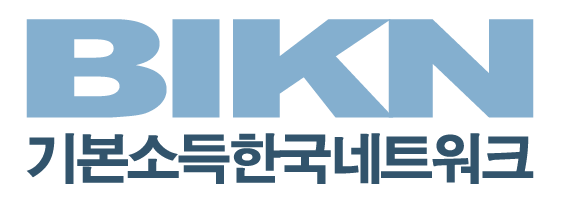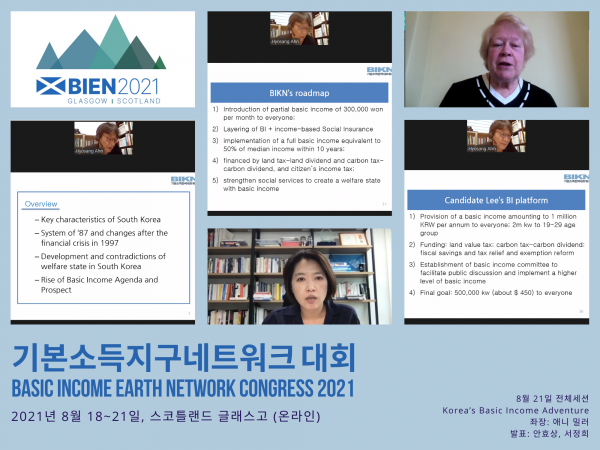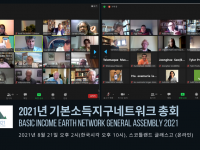기본소득지구네트워크 대회 (Basic income earth network congress 2021)
2021년 8월 18~21일, 스코틀랜드 글래스고 (온라인)
8월 21일 전체세션 “Korea’s Basic Income Adventure”
 Loading...
Loading...
발표문 개요
South Korea’s Basic Income Adventure
Hyosang Ahn (Basic Income Korean Network)
It would surprise many to learn that South Korea with its recent transition to a developed economy, a patchy welfare state, and the rapid neoliberal turn in the wake of the 1997 Asian Financial Crisis, is on the cusp of introducing a basic income. The surprise would only mount if we take into consideration that Basic Income Korea Network, the key organization of the Korean basic income movement, is only ten years old and basic income as an idea only began to gain currency with the wider public in the last few years. As such, the basic income movement in South Korea has gained the attention of many, and this, in turn, raises the importance of charting and drawing possible lessons from the South Korean experience.
South Korea has already gained prominence internationally due to its rapid industrialization in the latter half of the 20th century and the subsequent democratization, and its dynamism came to symbolize the country. This dynamism can be seen as a product of what at first glance may seem like conflicting values. Egalitarianism and ‘New Caste System’, individualism and collectivism, political cynicism coupled with democratic desire, familialism and the public good, amalgamation and conflict of these dichotomies form the tapestry that is the modern history of South Korea.
Basic income in South Korea rose out of the development of the modern welfare state and its limitations. With democratization came greater demand for the state’s support for its citizens’ well-being, but the lack of adequate social forces and institutions to meet this demand provided space for basic income movement to grow.
Given the relative weakness of the organized labor movement, which played such a central role in Western welfare states, civic movements centered on public intellectuals and policymakers played an important role here in social progress. The basic income movement was/is no exception, with BIKN providing the organizational heft for activists and intellectuals.
A long time ago, an American scholar and diplomat, Gregory Henderson, described Korean politics as the ‘Politics of the Vortex’. South Korea’s presidential system is an aspect of this centripetal tendency – a political culture with weak party politics and the projection of a desire for change onto a strong personality means that a presidential election allows nearly any agenda to catapult itself into the public consciousness.
Basic income stands as a central policy agenda and closer than ever to implementation because the leading candidate of the ruling party for the presidential election next March, Lee Jae-myung, has adopted basic income as his flagship policy. During his tenure as the mayor of Seongnam and the provincial governor of Gyeonggi-do, he launched youth dividend/youth basic income and implemented ‘disaster relief basic income’ during the COVID-19 pandemic. In addition, he intends on the provision of categorical basic income, and as a presidential candidate, one of his policy pledges is the implementation of a universal basic income.
But whether a proper implementation of basic income is possible remains to be seen for two reasons. One is the dynamism of the presidential election itself – even if Governor Lee were to win the Democratic primary, the current political situation is not exactly favorable to the ruling party, and his victory in the election is not guaranteed. Secondly, even in the case of his victory, the possibility of basic income in the power struggle between various factions in a presidential system remains just that, a possibility.
However, the chips may fall, the basic income movement will enter a new phase between the winter of 2021 and spring of 2022. Whether this momentum will ebb, like the previous breakthroughs of the basic income movement, or precipitate something greater depends on the movement itself.
[한국어 번역문]
한국에서 기본소득의 모험
한때는 발전국가로 평가받았고, 선진 복지국가와 비교할 때 여전히 부족한 게 많으며, 또한 1998년 외환위기를 거치면서 급속도로 신자유주의적 체제로 전환한 한국이 기본소득 도입의 문턱에 있다는 것은 사뭇 놀라운 일이다. 기본소득 운동의 중심 조직인 기본소득한국네트워크(BIKN)이 만들어진지 겨우 10년이 넘었고, 기본소득이 대중적으로 알려지기 시작한 것도 몇 년밖에 되지 않았다는 점을 감안하면 더욱 놀라운 일이다. 이런 이유로 한국의 기본소득 운동은 많은 사람들의 주목을 받고 있다. 따라서 한국에서 기본소득의 모험을 추적하고, 이로부터 가능한 교훈을 끌어내는 일이 필요할 것이다.
사실 한국은 20세기 후반 급속한 산업화, 뒤이은 민주주의의 성취로 이미 세계의 주목을 받았으며, 이로 인해 ‘역동성’은 한국을 상징하는 말이 되었다. 그런데 이 역동성은 극단적으로 대립하는 것처럼 보이는 가치 및 사태의 상호작용 속에서 드러난 것이다. 평등주의와 ‘새로운 신분제’, 개인주의와 공동체주의, 정치적 냉소주의와 민주주의적 열망, 가족주의와 공동선(public good) 등의 독특한(specific) 결합과 갈등 등은 시기마다 변주되면서 한국 현대사라는 테피스트리(tapestry)를 만들어냈다.
한국에서 기본소득의 위상(position)은 복지국가의 발전과 복지국가의 결여 사이의 변증법이 만들어낸 산물이다. 민주주의의 진전 속에서 시민의 삶에 대한 공적 책임에 대한 요구가 커졌지만, 이를 뒷받침할 만한 사회적 힘(social forces)과 제도의 결여는 기본소득이 움직일 수 있는 공간을 창출했다. 그리고 이 공간 속에서 기본소득 운동과 정치가 작동했다.
서구 복지국가의 주요한 기둥이었던 조직 노동자 운동이 약한 한국의 경우 공적 지식인(public intellectuals)과 정책가 들을 중심이 된 시민운동이 사회 진보에서 중요한 역할을 했다. 기본소득의 경우 기본소득한국네트워크로 결집한 학자와 사회운동가 들이 이런 역할을 했다.
오래 전에 미국의 학자이자 외교관인 그레고리 핸더슨(Gregory Handerson)은 한국 정치를 ‘소용돌이의 정치'(The Politics of the Vortex)라는 표현으로 포착하려고 했다. 중앙집중적인 정치 양상을 가리키는 이 말은 오늘날 한국의 대통령제와 대통령 선거에도 적용할 수 있을 것이다. 정당 정치의 미발달과 변화에 대한 열망을 강력한 인격에 투영하는 정치 문화 속에서 대통령과 대통령 선거는 어떤 의제(agenda)라 하더라도 단번에 중심적인 자리를 차지할 수 있는 동인이 된다.
오늘날 한국에서 기본소득이 중심적인 의제가 되고, 실현가능성이 그 어느 때보다 높은 것은 내년 3월에 있을 대통령 선거에 나선 여당의 주요 후보가 기본소득을 자신의 진지한 정책으로 제시한 인물이기 때문이다. 실제로 그는 성남시장과 경기도 지사를 하면서 청년배당/ 청년기본소득을 실시했고, 코로나19 상황에서는 ‘재난 기본소득’을 집행했다. 이외에 농민기본소득과 같은 범주형 기본소득을 실시하고자 한다. 이제 그는 대통령 후보로서 보편적 기본소득 실시를 공약으로 내세우고 있다.
하지만 기본소득이 제대로 실시될지는 여전히 미지수이다. 이는 두 가지 이유 때문이다. 하나는 대통령 선거 자체가 가지는 역동성 때문이다. 이재명 후보가 민주당 후보가 된다 하더라도 현재 한국의 상황은 여당이 유리하지 않으며, 집권에 성공한다는 보장이 없기 때문이다. 다른 하나는 집권한다 하더라도 대통령제를 구성하는 다양한 세력 사이의 권력 투쟁 과정에서 기본소득이 제대로 실현될 수 있는지는 여전히 미지수이다.
어느 쪽이든 2021년 겨울에서 2022년 봄 사이의 시기에 한국의 기본소득 운동은 하나의 순환을 마치게 될 것이다. 그 순환에 과거에 기본소득이 그러했던 것처럼 썰물로 끝날지 아니면 더 거대한 물결을 만드는 밀물이 될지는 전적으로 기본소득 운동의 힘에 달려 있을 것이다.


